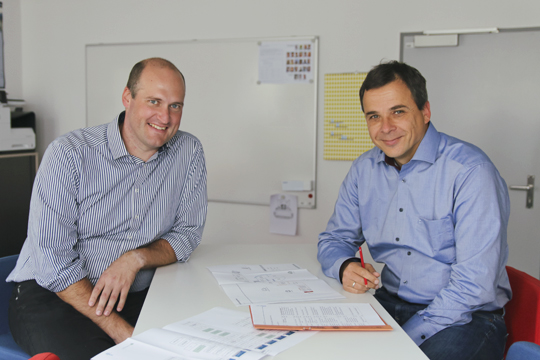Launch of a project for the next five years
Freiburg, Oct 01, 2019
Smoother, faster, more reliable: Administrative processes in the future will be more efficient - from picking up keys to claiming travel expenses, to managing building works. The university sees the key to modernization in a process of change in which employees from all areas of the administration work together with the users: These more efficient processes are collected under the heading of Connected Services. The project kicks off on 14 October 2019 with the first workshops. Rimma Gerenstein spoke with Andreas Friedrich and Dr. Reiner Fuest of the project team about what employees can expect on that day and what will happen once the ball is rolling.

Networked work: The University of Freiburg aims to make its processes more efficient with Connected Services. Photo: Nuthawut/stock.adobe.com
Dr. Fuest, Mr. Friedrich, what is the idea behind the notion of Connected Services?
Reiner Fuest: We have given the Connected Services project a subheading as well: “Rethinking administration, improving processes, strengthening cooperation.” I think that these keywords describe the idea well and make it much more concrete. We are looking at all areas of administration; that means administrative units at the level of professorships, institutes, faculties, centers and the university’s central administration. We don't seek just to think about modernization, we also want to act.
Andreas Friedrich: The project has a long history. In recent years there have been several evaluations, surveys of the staff and scrutiny by the state audit office. Our preparations for Excellence funding have also set things in motion. Based on these analyses and driving factors, we have now drawn up a concrete plan. The focus is on change processes in which the people who implement the change or who are affected by it work together. We have identified several key areas such as personnel management, digitization and finance. Every change that is initiated under the Connected Services heading is therefore part of a wider process. In this way we aim to prevent many employees from working in isolation in their respective niches. Of course, these change processes are methodically secured.

Andreas Friedrich (left) and Reiner Fuest are part of the project team. Photo: Sandra Meyndt
Which methods did you choose for this?
Reiner Fuest: Methods are not always a simple issue at the university, because there are many different disciplines, working with different methods. It is pretty much impossible to offer something and have everyone shout hooray! That is why we chose a method with many degrees of freedom. There are certain guard rails to follow, but the model can be easily adapted to a particular institute, professorship, department or institution at any time. We see it as a bit like a board game. There is a starting point and a goal - and there are various project phases in between: the task, the creation of a project plan, the editing phase, feedback to users, a pilot and, finally, implementation. The workshop participants will take their cues from this plan.
In the workshops you aim to improve concrete issues arising from everyday work. What are some examples?
Andreas Friedrich: To start with, we don't plan to chip away at the really big blocks such as the travel expenses process. We want to start with smaller but worthwhile changes, and certain issues are better suited than others. This includes the creation of employment contracts and electronic absence management. A good example is the issue and management of physical keys, which we want to digitalize and develop further. In this way, nobody has to keep their own records in parallel to the central system in order to keep an overview. At first glance, such topics may not appear to be the most pressing concerns, but they could deliver rapid results that benefit a large number of employees. I remember, for example, how a few years ago the university printers changed a few processes. I was the coordinator of a Collaborative Research Center at the time and experienced this as something which made my daily work much easier.
What happens after the project is launched?
Rainer Fuest: The workshops will provide us with a valuable snapshot, because of course a few hours is not enough time to complete a process in its entirety. For each topic, however, there will be expert representatives who will drive the process forward, on the basis of the results, to implementation. That is the promise of university management. This makes it clear that the Connected Services project is not just one day in October, but the start of a process for the next five years.
Join the discussion
The Connected Services introductory even is on 14 October 2019 from 9am to 2pm. All members of the University of Freiburg are invited. The day will include workshops in which participants can get to grips with concrete processes of change. Please register by 7 October. The event counts as work time.

